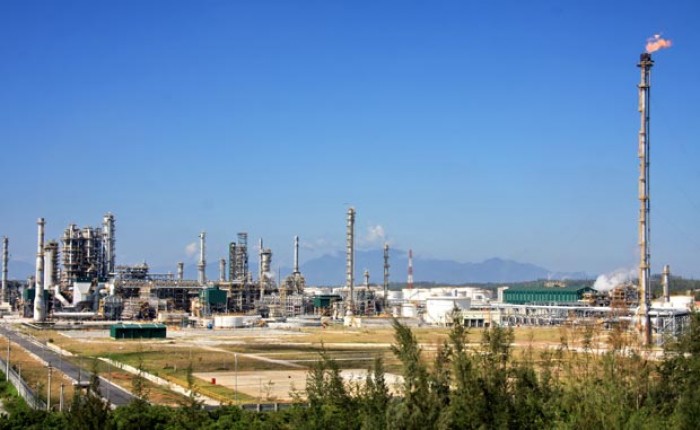Vietnam’s sole operating oil refinery sets surprisingly low profit target for 2017
 |
| illustration photo |
Less revenue, more profit
BSR surprised industry-watchers by setting its profit target at one third of the number of 2016. However, looking at the activities of BSR from 2013 to 2016, there is a marked tendency of revenue decreasing significantly but profit increasing.
The revenue has been on a trend of steady decrease. In 2013 BSR’s total revenue was VND154.32 trillion ($6.78 billion), the pre-tax profit was VND2.97 trillion ($130.2 million), in 2015 the corresponding numbers were VND96 trillion ($4.2 billion) and VND6.37 trillion ($279 million); in 2016 the numbers were VND75.2 trillion ($3.3 billion) and VND5 trillion ($219.45 million).
The amount of money that BSR paid to the government budget decreased from VND28.4 trillion ($1.245 billion) in 2013 to VND12.41 trillion ($543.9 million) in 2016.
At the January review conference of Vietnam National Oil and Gas Group (PetroVietnam), BSR CEO Tran Ngoc Nguyen revealed that 2016 was a harsh year for the company because despite producing domestically, its prices have to factor in the import tax, ending up in some cases 10 per cent higher than imported oil and gas products.
The prices of Dung Quat’s products are calculated as the sum of the price of similar imported products and the applicable tariff rate.
When the Vietnam-Korea Free Trade Agreement was signed, Vietnam halved the import tariff on South Korean gasoline, to 10 per cent, effective since December 20, 2015. Meanwhile, Dung Quat’s products are still subject to an import tax of 20 per cent. According to PetroVietnam and BSR’s earlier claims, this disparity forced a number of their local consumers to switch to imported sources.
Earlier, the company said that because of the tax policy, its clients turned to buy foreign petrol, leading to BSR’s products piling up, overloading its warehouse, putting further burdens on the refinery’s operations.
However, Decision No.1725/QD-TTs from Prime Minister Nguyen Xuan Phuc in early September 2016 allowed BSR to set its own price, which gave the refinery a fighting chance by evening odds and clients started coming back.
Therefore, on November 9, 2016, BSR completed 100 per cent of its 2016 production goal, 52 days earlier than the original plan. Actual 2016 income also surpassed the plan by 7 per cent. Remarkably, the after tax profit of BSR was VND2.3 trillion ($100.2 million), which equals 285 per cent of the goal.
According to PetroVietnam’s assessment, the profit of BSR was 2.8 times as much as the annual target, which was the result of the vast difference between the price of the final product and the price of raw oil.
In 2017, BSR set the production goal lower than in 2016 to carry out an overall maintenance from June 3 to July 5, 2017.
Nonetheless, Nguyen emphasised that the goal is to finish five to seven days early. Additionally, after the maintenance, the factory will be able to raise the production level by 15-20 per cent of the designed capacity.
Expansion and equitisation still on the table
By the end of 2017, Dung Quat Refinery will be the only refinery running commercially in Vietnam. To help the refinery recover its initial investments, the government gave it a lot of preferential policies.
BSR is currently on the list of 106 state-owned enterprises in which the government is going to hold less than 50 per cent of the chartered capital after equitisation, according to Decision No.58/2017/QD-TTg of the prime minister.
2017 is also the year when BSR plans to finish its equitisation process. PetroVietnam has already approved the choice of BIDV Securities Company and UHY ACA Ltd. as the consulting companies to valuate the company and draw up the equitisation plan.
In late December 2016, the company’s valuation was completed and the equitisation plan is expected to be available in March 2017.
However, the official release of the company’s valuation and equitisation plan is to be decided by the State Audit and the Ministry of Industry and Trade.
Alongside the equitisation process, BSR is also carrying out a project to expand and upgrade the capacity of Dung Quat Refinery from 6.5 million tonnes to 8.5 million tonnes per year, equivalent to 192,000 oil barrels a day. The total capital for the project is approximately $1.82 billion.
The success of the expansion project would help the equitisation.
However, this is not going to be easy because until now, BSR still has not been able to find a strategic foreign partner that is willing to buy 49 per cent of the chartered capital and also take part in the project.
| RELATED CONTENTS: | |
| Oil giant BSR to exceed output target | |
| Dung Quat refinery operator’s IPO expected by end of 2017 | |
| Dung Quat greenlighted to set own prices | |
What the stars mean:
★ Poor ★ ★ Promising ★★★ Good ★★★★ Very good ★★★★★ Exceptional
Latest News
More News
- Masan Consumer names new deputy CEO to drive foods and beverages growth (February 23, 2026 | 20:52)
- Myriad risks ahead, but ones Vietnam can confront (February 20, 2026 | 15:02)
- Vietnam making the leap into AI and semiconductors (February 20, 2026 | 09:37)
- Funding must be activated for semiconductor success (February 20, 2026 | 09:20)
- Resilience as new benchmark for smarter infrastructure (February 19, 2026 | 20:35)
- A golden time to shine within ASEAN (February 19, 2026 | 20:22)
- Vietnam’s pivotal year for advancing sustainability (February 19, 2026 | 08:44)
- Strengthening the core role of industry and trade (February 19, 2026 | 08:35)
- Future orientations for healthcare improvements (February 19, 2026 | 08:29)
- Infrastructure orientations suitable for a new chapter (February 19, 2026 | 08:15)















 Mobile Version
Mobile Version